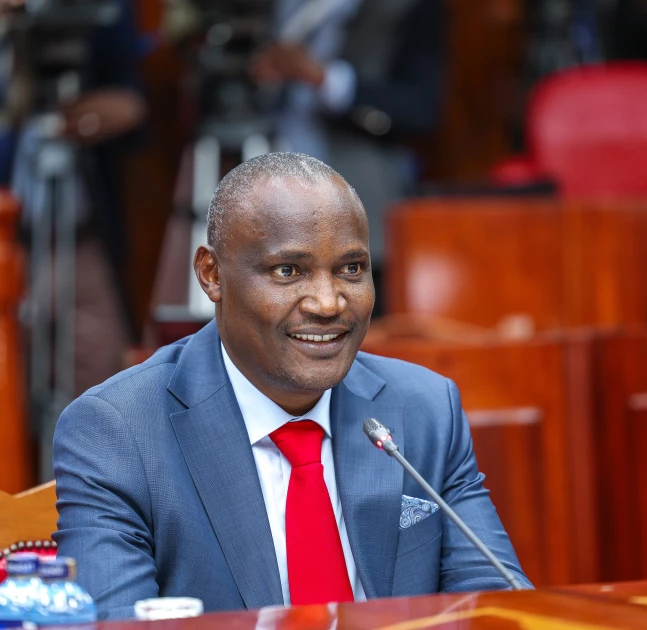Auditor General Nancy Gathungu raised concerns about the growing number of civil servants whose salaries fall below the one-third rule. In her report for the 2022/23 financial year, Gathungu flagged multiple state departments for non-compliance with the law, including the Roads Department, where hundreds of employees were found to be receiving net pay that violated the one-third rule
National Treasury Cabinet Secretary John Mbadi is set to appear before parliament to explain why his office has not addressed the growing issue of illegal salary deductions that have caused many public servants to earn less than the legally required one-third of their basic salary. The deductions, which have been exacerbated by recent tax reforms, have left thousands of civil servants in violation of the Employment Act of 2007, which protects employees from deductions that reduce their take-home pay to less than a third of their basic salary.
According to the Employment Act, employers are prohibited from deducting more than two-thirds of an employee’s gross pay. The law mandates that workers should receive at least one-third of their basic salary after all deductions, including statutory taxes and social security contributions—commonly referred to as the “one-third rule.” Employers who violate this rule are committing a criminal offence and are liable to both penalties and reimbursement for any unlawful deductions.
The Public Accounts Committee (PAC) of the National Assembly has now called on Mbadi to clarify the National Treasury’s response to this issue, which has led to widespread concerns about the financial well-being of civil servants. In particular, MPs want to know what actions the Treasury is taking to address the fact that many public servants are now earning less than the legally required one-third of their salary, a situation that has worsened due to increased taxes under the current administration.
A recent report from the Public Service Commission (PSC) revealed alarming statistics: of the 79,453 public officers in Kenya’s civil service, 17,132—about 21.6 per cent—are now earning less than one-third of their basic salary. The problem extends beyond the national government to the counties, with Kiambu County standing out, where 2,248 employees are also earning less than a third of their basic pay.
The PAC, chaired by Butere MP Tindi Mwale, has emphasized that the problem stems from new tax measures introduced by the Kenya Kwanza government over the past two years. These measures include a 1.5 per cent levy on employees’ gross pay and an additional 2.75 per cent deduction for the Social Health Insurance Fund (SHIF). The committee noted that these taxes have pushed many civil servants’ net pay below the statutory one-third threshold.
“The new taxes have pushed employees’ pay below the required threshold,” Mwale explained. “This has created a serious problem, where employees are no longer receiving their full legal entitlement.”
Auditor General Nancy Gathungu also raised concerns about the growing number of civil servants whose salaries fall below the one-third rule. In her report for the 2022/23 financial year, Gathungu flagged multiple state departments for non-compliance with the law, including the Roads Department, where hundreds of employees were found to be receiving net pay that violated the one-third rule.
For example, during an audit of the Integrated Payroll and Personnel Database (IPPD) records, it was revealed that in April 2023, 131 employees in the Roads Department were earning less than a third of their basic salary. Gathungu’s report highlighted the serious financial implications of this non-compliance, noting that many employees, having received temporary relief from tax deductions during the COVID-19 pandemic, were now struggling with loans and other financial obligations as a result of their reduced pay.
“In the circumstances, employees were left with more funds in their payslips, took advantage of the same, and took long-term obligations in the form of loans,” Gathungu’s report stated. “Once the tax relief was lifted, they fell victim to non-compliance with the one-third rule.”
During a recent meeting with Roads Principal Secretary Joseph Mbugua, MPs were informed that the issue partly stemmed from the government’s temporary tax relief measures introduced during the COVID-19 pandemic, which had given employees a reprieve from certain tax deductions. However, Mbugua acknowledged that this relief had inadvertently led to violations of the one-third rule once it was lifted.
“This issue arose due to the tax relief extended to employees during the COVID-19 pandemic,” Mbugua explained, “but now that the relief has ended, it is clear that many employees are now falling below the legal threshold.”
In light of these developments, MPs are urging the National Treasury to review the impact of these tax reforms and recommend necessary adjustments to the policies to bring public sector salaries into compliance with the Employment Act. Rarieda MP Otiende Amolo has called for a thorough review of the regulations governing salary deductions to ensure they align with the current economic reality.
“We need to engage with the National Treasury to propose changes to the policy, to ensure that the salaries of public servants comply with the law,” Amolo said.
The Public Accounts Committee’s summons to Treasury CS John Mbadi underscores the urgency of resolving this issue and ensuring that public servants receive their full legal entitlement in accordance with the Employment Act. With many workers already facing financial strain, the outcome of this parliamentary inquiry will be critical in determining how the government addresses salary compliance in the wake of ongoing tax changes.





